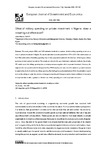Effect of military spending on private investment in Nigeria: does a crowding-out effect exist?

View/
Use this link to cite
http://hdl.handle.net/2183/32642Collections
Metadata
Show full item recordTitle
Effect of military spending on private investment in Nigeria: does a crowding-out effect exist?Author(s)
Date
2022-12-01Citation
Raifu, I. A. (2022). Effect of military spending on private investment in Nigeria: does a crowding-out effect exist?. European Journal of Government and Economics, 11(2), 167-192. https://doi.org/10.17979/ejge.2022.11.2.8758
Abstract
[Abstract] This study adopts ARDL and VAR estimation methods to examine whether military spending crowd-out or crowd-in private investment in Nigeria. We use the data that covers the period from 1970 to 2019. Our results, based on the ARDL method, show that military spending only crowds-out private investment in the short run. In the long run, military spending crowds in private investment. The results are robust to the use of alternative estimation methods. Specifically, IRF results show that military spending has a contemporaneous negative effect on private investment. However, the negative effect turns positive after the third period. Also, FEVD results show that most of the variation in private investment is explained by its shock and few by military spending. Our findings have policy implications. While it is advisable to spend more on the military to curtail the activities of insurgents, bandits and kidnappers and to restore confidence in investors, it is important also to take cognisance of the fact that military spending can crowd out private investment.
Keywords
Military spending
Private investment
Crowding-out effect
Private investment
Crowding-out effect
Editor version
Rights
Attribution-NonCommercial 4.0 International (CC BY-NC 4.0)





